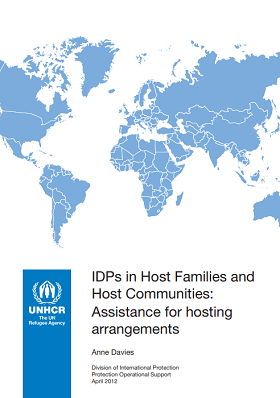IDPs in Host Families and Host Communities: Assistance for Hosting Arrangements
The phenomenon of internally displaced persons (IDPs) and refugees residing with host families is still relatively unexplored in comparison to what is known about IDPs and refugees living in camps. Of the nearly 14.7 million IDPs protected and assisted by UNHCR in 2010, an estimated 52% of the total live outside formal camps in both rural and urban areas. At least half of the 54 countries monitored by IDMC have few or no camps for IDPs.Alternative coping mechanisms, including living with host families in host communities, are the norm for a majority of IDPs. It is often assumed that IDPs in hosting arrangements are located mainly in urban areas and are likely to be more affluent than IDPs in camps – and consequently less vulnerable or in need of assistance. This view is being challenged by studies showing the extent of hosting in rural areas and the growing prevalence of host families and host communities suffering economic strains from sharing already meagre resources with IDPs.
Humanitarian actors are increasingly advocating for greater assistance to IDPs living outside camps and with host families and/or in host communities. This stems in part from the recognition that, if more IDPs live outside camps than within them and only IDPs in camps receive assistance, then over half the global IDP population is being missed (while also recognizing that not all IDPs outside camps need assistance). A related consideration is the human rights concept of providing assistance to displaced populations without discrimination owing to their ethnic background, reasons for displacement or where they might be living: the Guiding Principles on Internal Displacement state that ‘every IDP has the right to liberty of movement and freedom to choose his or her residence’ and should therefore receive equal treatment wherever they choose to live.
This study examines cases where UNHCR and other humanitarian actors have implemented programmes to support hosting, both in individual families and host communities, with a view to sharing experiences and learning for future programmes. Examples of assistance methods examined in this study cover different displacement contexts and phases, and fall into three main categories:
• Assistance to IDPs in host families/and their hosts: cash-based and non-cash-based;
• Assistance to host communities: community infrastructure and/or services; support to information or social development centres; Quick Impact Projects (QIPs); and
• A combination of assistance to individual families and host communities (the most prevalent model).



